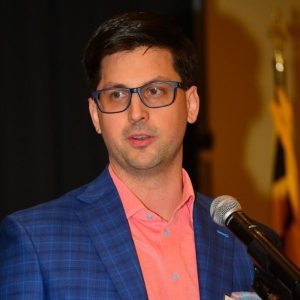INFO alumnus John Eubank IV establishes endowed and matched scholarships to support students

John Eubank IV graduated from the University of Maryland College of Information (INFO) with a Master of Information Management in 2011. In 2021, he participated in a defense contractor equity event. Reflecting on his own educational journey, which was funded by scholarships, he felt it was an opportune moment to give back. “I wouldn’t be where I am without scholarships,” he says. Consequently, he established an endowed scholarship at Towson University (TU).

John Eubank
When an acquaintance working in fundraising at UMD suggested setting up another scholarship, Eubank IV learned about the Maryland Promise Scholarship, which offers matching donations through the Clark Foundation. “It was almost a no-brainer to take advantage of that,” he says, highlighting the appeal of the program’s dollar-for-dollar match, which effectively doubles the impact of any donation.
Eubank IV believes there is an urgent need to support education, especially as college enrollment declines. He says, “We must give forward from our individual prosperity and success to ensure the sound and relevant education of future generations.”
By creating scholarships and through other philanthropic giving, Eubank IV aims to provide economic opportunities otherwise not available. Eubank IV hopes to encourage students to pursue fields with long-term impacts, combining technology and information sciences, whether they choose careers in cybersecurity, medicine, mental health, religion, or other critical areas.
Becoming a Cybersecurity Data Analyst
Eubank IV had an interest in data systems and solving overlooked problems from a young age. He started college at 15, and completed his dual bachelor of science degrees in computer information systems and business administration from TU. Upon graduating in 2009, on the tail end of the financial crisis, multiple job offers were rescinded. In this time, many people encouraged him to pursue an MBA, but he felt that “MBA programs at the time weren’t teaching enough technology inside of them. The world is modernizing, and the MBA without deep education in technology and cybersecurity is a legacy relic.” The INFO coursework enabled pursuing a well rounded business, technology, engineering, and data science focused degree, aligned to the modern information age.
Eubank IV attended college on nights and weekends while working in accounting for a large defense contractor. Several years post-graduation, a timely job opening led to a position in the data analytics and cybersecurity field. “This was purely a higher power at work,” he says. “The day I showed up to be a low level project coordinator the program manager quit. I was quickly promoted to leading what has become one of the most influential programs in federal cyberspace operations.”
Having worked in the technology space for years now, Eubank IV understands its implications for students. “Technology has enabled unbelievable amounts of information to be at our fingertips,” he says. Believing this access to global information is unprecedented, he is keen on “getting value out of that information.”
Transitioning to the Experience Age
Eubank IV believes we are transitioning “from the information age to the experience age,” citing changes in how we interact with information through advancements like augmented reality, extended reality, and virtual reality systems. He notes the revolutionary impact of artificial intelligence (AI) and large language models, saying, “The field of information sciences is growing faster than it’s ever grown before, our challenge is understanding the truth and value.”
His hope is that scholarships can attract new individuals and creative perspectives to address emerging challenges while accelerating technology adoption and access.